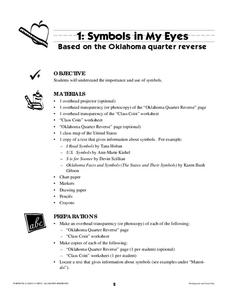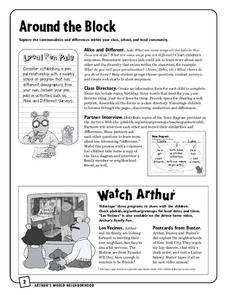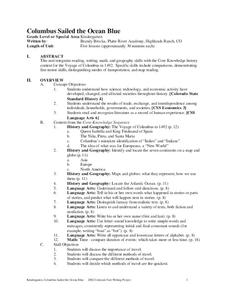US Mint
Desert Dwellers
What can a quarter possibly teach young learners about desert ecosystems? More than you might think. After displaying and discussing the included picture of the Arizona state quarter, the class participates in a series of shared reading...
US Mint
Symbols in My Eyes
Explore the hidden meanings behind the images on US currency with this elementary school activity on symbolism. Starting with a class discussion about symbols, children go on to brainstorm different objects that represent the Unites...
US Mint
Rename That State!
As Shakespeare famously wrote, "A rose by any other name would smell as sweet," but can the same be said for a state? In this elementary geography lesson, young scholars are assigned specific states to research using the information they...
Laura Candler
Fishbowl Multiplication
Transition young mathematicians from using repeated addition to multiplication with this fun, hands-on activity. Using manipulatives and the included game board, students work in pairs modeling repeated addition problems before...
PBS
Around the Block
Arthur and his friends help children explore the concepts of family, community, and diversity in a fun series of activities. From performing peer interviews to mapping out the different places learners have lived or visited, this...
Oglebay Institute
Post-Impressionism: Van Gogh Drawings
Turn your young artists into little Vincent van Goghs with a lesson on brush stroke style and color blending. Pupils practice the painting technique by sketching various shapes before recreating a van Gogh piece or creating an original...
Curated OER
The Magic Opera
Introduce your young learners to opera by dressing up as Mozart and recounting some of the fascinating details of his life and music. After exploring the Metropolitan Opera's site for kids, the class listens to a reading of Kyra...
Curated OER
Introduction to Ludwig van Beethoven
"Ode to la Tortilla" and "Ode to Joy"? Sure! Use Gary Soto's poem to introduce learners to the ode format. After examining the descriptive words Soto uses, class members study a poster of Ludwig van Beethoven, suggest words that describe...
Name Parts of a Computer and Terms for Interface Elements
Familiarize your young learners with the parts of a computer and some basic key terms relating to technology. As the teacher demonstrates using an LCD projector, class members practice moving a mouse, opening the Internet, typing in a...
Terminix
The Pollinator
What do bees and children have in common? They both love their sweets. Decorate a flower pot or bucket to look like a brightly colored flower and fill it with wrapped candy and cheese puffs. Have learners reach into grab the candy,...
Baylor College
Gases Matter
As a demonstration or as a hands-on activity, your class watches as the combination of vinegar and baking soda produce carbon dioxide gas. The intent of the lesson is to help youngsters understand that gases occupy space. It is included...
Baylor College
Animals' Needs
Explore the wonderful world of earthworms as your class learns about the requirements of animal life. After building soda bottle terrariums, students observe worms over the course of a couple weeks, building an understanding that all...
Baylor College
We Need Water
There's nothing quite like a glass of ice-cold, freshly squeezed lemonade. Lesson seven of this series explains how the water humans need to survive can come in many forms. Teach your class about how much water humans require every day...
Baylor College
Air and Breathing
Blow some bubbles and learn how living things need air in the eighth lesson plan of this series. Young scientists investigate this important gas by observing bubbles and monitoring their own breathing. A simple and fun activity that...
Baylor College
A Place to Be
Home sweet home. Humans, birds, beavers, ants, we all need a place place to rest and keep us safe. In the ninth lesson of this series, the importance of shelter is discussed as the teacher reads aloud the book Tillena Lou's Day in the...
Baylor College
Needs of Plants
What better way to learn about plant life than by creating a class garden? Young botanists start with a brief discussion about radishes before planting seeds and watching them grow. To determine the importance of water, sunlight, and...
Baylor College
Food for Kids
Immediately capture the attention of your class with the smell of freshly popped popcorn in the sixth activity of this series on the needs of living things. Young scientists first use their senses to make and record observations of...
MEDL Mobile Enterprises
Marlee Signs
Start communicating in American Sign Language with this handy app. Made up of a series of video clips, the app makes it easy to begin really saying something with your hands.
Curated OER
Henna Hand Designs Art Lesson: Make a Unique Self-Portrait
Explore the art and cultural significance of henna hand designs. You engage the class by providing background information that describes who, what, where, when, and why henna designs are used. Then, the class uses the included templates...
Curated OER
Butterfly Life Cycle
Focused little scientists will flitter their arms back and forth across the room with excitement as they learn the life cycle of a butterfly and how living things grow and change over time.
Core Knowledge Foundation
Columbus Sailed the Ocean Blue
Young adventurers embark on a journey, setting sail along the blue ocean with Christopher Columbus. Teachers will find that this unit makes their lesson planning smooth sailing!
ESL Kid Stuff
Past Tense Activities - Regular Verbs
Here is a supplemental lesson plan regarding past tense verbs for English language learners that is a great tool for the classroom when you are teaching grammar exercises.
Achieve3000
Discriminating Phonemes
Develop the fluency of beginning readers one sound at a time with this phonemic awareness activity. Through a series of whole-class instruction, independent practice, and collaborative learning activities, children practice identifying...
NSW Department of Education
Relationships Between Formal Measurement Units: Measure and Record Mass in Kilograms and Grams
Teach the masses about the metric system with this hands-on measurement lesson. Given a fruit or vegetable, learners estimate, measure, and convert its mass using the metric units gram and kilogram.

























